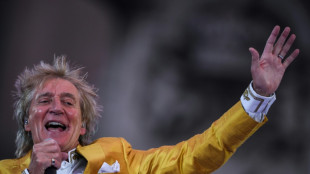
| RBGPF | 1.33% | 61 | $ | |
| SCS | -1.33% | 13.54 | $ | |
| RIO | -1.53% | 62.03 | $ | |
| RYCEF | 0.44% | 6.8 | $ | |
| BTI | 1.01% | 37.71 | $ | |
| CMSD | -0.61% | 24.43 | $ | |
| RELX | 0.51% | 46.81 | $ | |
| NGG | -0.68% | 62.83 | $ | |
| CMSC | -0.65% | 24.57 | $ | |
| GSK | -0.38% | 34.02 | $ | |
| VOD | -0.56% | 8.86 | $ | |
| BCE | -1.46% | 26.63 | $ | |
| BCC | -2.76% | 148.41 | $ | |
| BP | -1.24% | 28.96 | $ | |
| AZN | -0.06% | 66.36 | $ | |
| JRI | -0.98% | 13.24 | $ |

Geopolitics and glitz as Ukraine tipped to win Eurovision
Kitsch, glitz and geopolitics -- the Eurovision Song Contest is back in two weeks' time, with Russia excluded and conflict-ravaged Ukraine the hot favourite to take the crown.
"Stefania", by Ukrainian folk-rap group Kalush Orchestra, has been tipped by bookmakers to win the cult competition, this year being held in the northern Italian city of Turin on May 14.
Russia was barred by organisers the day after it invaded its neighbour in late February.
And with lyrics such as "I'll always find my way back home, even if all the roads have been destroyed", the bookies expect Ukraine to benefit from an outpouring of public support.
A collation of leading bookmakers on fan site Eurovisionworld has put Kalush Orchestra as the runaway favourites, with hosts Italy in second place.
Mahmood and Blanco's "Brividi" hopes to repeat the success of their country last year, when lederhosen-clad rockers Maneskin triumphed with "Zitti e Buoni" and went onto global fame.
But with Eurovision, whose riot of pop, outrageous outfits and international relations drew 180 million viewers across Europe last year, anything is possible.
"The public show strong support for Ukraine but I would not assume Ukraine is going to win," said Dean Vuletic, a historian and expert on the geopolitics of Eurovision.
"In 1993, Bosnia and Croatia did not finish highly," despite being under attack, he told AFP, adding: "While the Ukrainian entry is strong, there are other entries of high quality."
- Roars of war -
It is not the first time the roars of war have made themselves heard in the competition, begun by the European Broadcasting Union in 1956 with just seven countries.
Greece boycotted Eurovision after Turkey invaded Cyprus in 1974, and tensions in the Balkans have often spilled on stage.
In 2019, Ukraine withdrew from Eurovision after its singer dropped out in protest at rules against touring in Russia, while last year Moscow ally Belarus, targeted by EU sanctions, was excluded in a move it slammed as politically motivated.
Benoit Blaszczyk, secretary of France-Eurofans, the French branch of the OGAE international fan association, said Ukraine will get the "sympathy vote" but not just that.
"They have a good song," he told AFP, adding that Ukraine -- which consistently makes it through to the grand final -- "gets attention every year, they are often ahead of their time".
- Voting blocs -
Votes are cast by music industry professionals and the public from each country -- and out of fairness, nobody can vote for their own nation.
Blocs of nations have in the past often voted together, from the francophone countries France, Belgium, Switzerland and Luxembourg, to the Nordic and more recent central or eastern European blocs.
But "when you look at studies, voting blocs do not determine the winners", said Vuletic.
Almost 4,400 Eurovision fans affiliated to OGAE have already cast their ballots for their favourite songs in Turin -- and Ukraine came in 11th, with repeat winner Sweden on top, followed by Italy and Spain.
The Ukrainian OGAE fans crowned Poland -- a country that has taken in millions of Ukrainian refugees since Russia's invasion-- followed by Spain, France, Norway and Sweden.
Meanwhile, Russian fans gave the top score -- 12 points -- to pro-Moscow Serbia, followed by Lithuania, Spain and Latvia.
In Serbia, Slobodan Todorovic, editor-in-chief of fan site Evrovizija.rs, insisted each act should be judged on its merits.
"A potential Ukraine victory (for political reasons) would cast a dark shadow on Eurovision and the values it upholds –- neutrality, independence from politics and respecting and celebrating diversity," he told AFP.
But even if they are not formally crowned Eurovision champions, there are many who believe Kalush Orchestra -- who needed special permission to leave Ukraine -- have won just by being there.
"The fact they will be able to show on stage, that they were able to leave the country and receive these messages of support is already a success," said Vuletic.
P.Conti--IM



